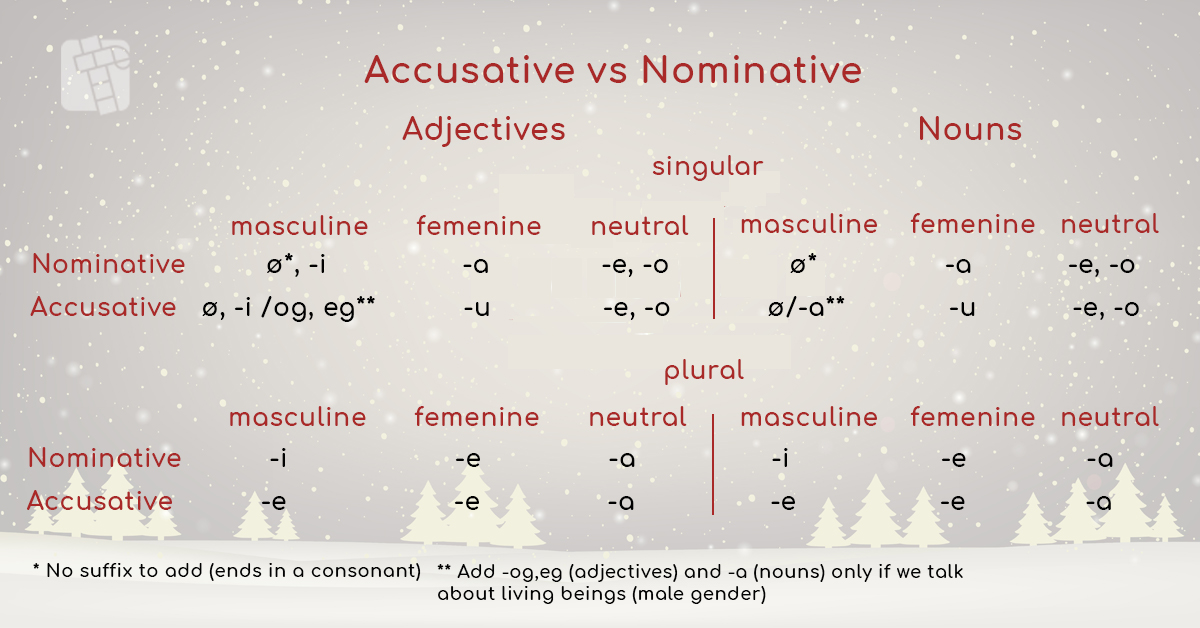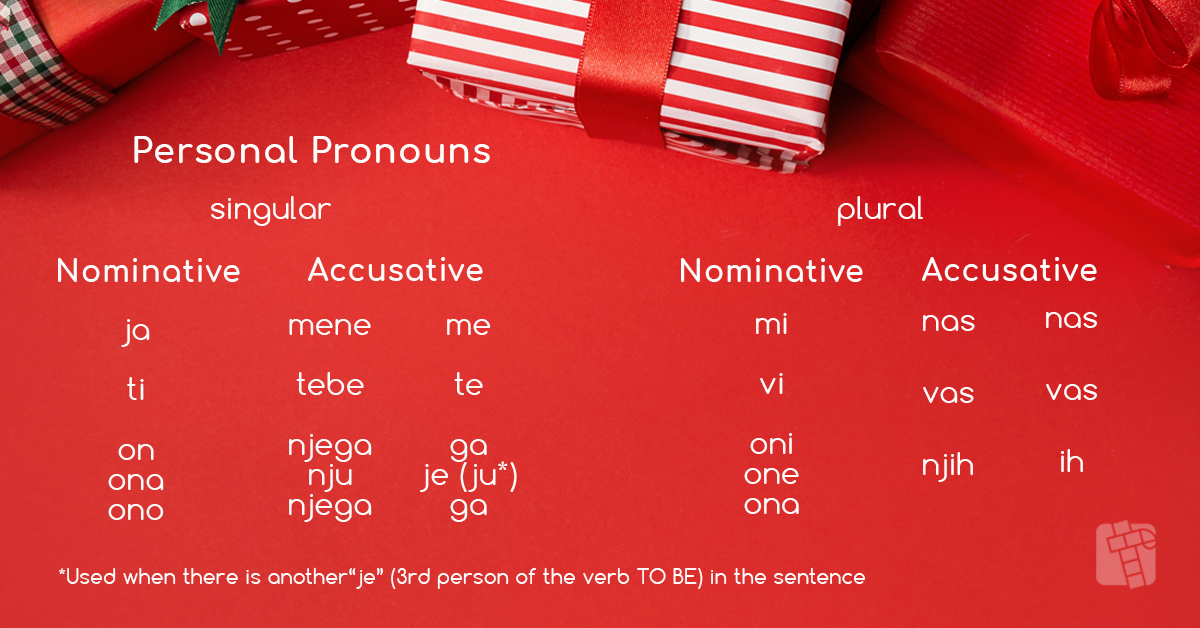
After a very strange year affected by the pandemics, we finally made it to the period we are happy about – Christmas and New Year´s holidays. It´s a time to be with your family if possible in these circumstances.
This brings us to our topic: the accusative case. You may wonder why Serbian grammar would be related to holidays. Although we use the accusative on daily basis, during the holidays it definitely can’t be avoided. Why? Well, because of all the presents and food, of course.
Case System in Serbian Review
The word order in the Serbian language is very flexible thanks to padeži – the case system. Nouns, along with pronouns and adjectives, change endings depending on the role they have in a sentence. When you use a case, the meaning changes. Watch this:
Marko ima olovku. = Marko has a pen.
Marko piše olovkom. = Marko writes with a pen.
Languages like English do not use this system. They rely on prepositions and strict word order. In English, depending on the word order we know who did what and can make sense of the sentence.
Check out these examples:
Ja sam dao mapu Milanu. = I gave a map to Milan.
Ja sam Milanu dao mapu. = I to Milan gave a map.
Milanu sam dao mapu. = To Milan I gave a map.
Mapu sam dao Milanu. = A map I gave to Milan.
As you can see, if you change the word order in English, it wouldn’t sound natural or make much sense, whereas in Serbian all four sentences sound well. The slight difference between them is that the thing you mention first is the most emphasized.*
You need to get the word order right in English or it doesn’t make sense. On the other hand, in Serbian, the order is more flexible, but you need to learn to use cases and change word endings based on what you want to say.
The accusative case as a direct object
Most of the cases in Serbian have more than one role they perform. Even though the same thing goes for the accusative, now we are only going to focus on a direct object role.
A direct object is someone or something directly receiving action from a subject, the one performing the action. It is the thing the subject acts upon.
I drank coffee.
In English, the direct object goes after the verb.
In Serbian, this doesn’t have to be the case.
Pila sam kafu.
Kafu sam pila.
It’s more important to get the ending of the direct object right.
*This can also depend on the tone you apply.
Forming the Accusative Case
Nouns and Adjectives
The form of the accusative case is very similar to the nominative case. If you know how the nouns and adjectives end in their “base form”, this should be easy. You can take a look at the photo below.

Let’s see some examples of the typical phrases with accusative you would hear during the holidays:
- Dobio sam divan poklon. I got an amazing gift.
Direct object: divan poklon (nominative singular form)
- Okitio sam moju jelku. I decorated my Christmas tree.
Direct object: moja jelka (nominative singular form)
- Dali su mi mekano ćebe za Novu godinu. They gave me a soft blanket for New Year’s.
Direct object: mekano ćebe (nominative singular form)
- Stavljam velike ukrase na jelku. I am putting big ornaments on the Christmas tree.
Direct object: veliki ukrasi (nominative plural form)
- Ješćemo ukusne sarme za Božić. We will eat delicious stuffed cabbage for Christmas.
Direct object: ukusne sarme (nominative plural form)
- Pićemo kvalitetna vina. We will drink quality wines.
Direct object: kvalitetna vina (nominative plural form)
Pronouns
One person says: I saw Ana for Christmas.
Another person says: Hey, I saw her too.
Why not say: I saw she too?
You know that you are supposed to use her instead of she in this situation. You probably understand the meaning of “I saw she” because of the word order in English, but it sounds a bit strange, right?
Breaking news, guys. This is what we call the accusative case in Serbian. Of course, this topic is more complex and applies to various parts of speech. Let’s see how we can apply it to pronouns.
First, take a look at the photo and check personal pronouns’ forms in the nominative (base form) and accusative.

In the accusative case, personal pronouns can be long or short. You cannot use them interchangeably, though. We use the short ones in the middle of the sentence:
Ja sam je video. I saw her.
We use the long ones in the following situations:
- at the beginning of the sentence: Nju sam video. I saw her.
- at the end of the sentence: Video sam nju. I saw her.
- after prepositions: Za nju sam pitao. I asked about her.
What version should you opt for, long or short? Most of the time we use the short version. But our students usually find it easier to use the long version in the beginning. If that is your case too, go for it.
Let’s take a look at some examples and see how to use these pronouns:
- Dobio sam divan poklon. I got an amazing gift.
Dobio sam ga. I got it.
- Okitio sam moju jelku. I decorated my Christmas tree.
Okitio sam je. I decorated it.
- Dali su mi mekano ćebe za Novu godinu. They gave me a soft blanket for New Year’s.
Dali su mi ga. They gave it to me.
- Stavljam velike ukrase na jelku. I am putting big ornaments on the Christmas tree.
Stavljam ih na jelku. I am putting them on the Christmas tree.
- Ješćemo ukusne sarme za Božić. We will eat delicious stuffed cabbage for Christmas.
- Ješćemo ih za Božić. We will eat them for Christmas.
- Pićemo kvalitetna vina. We will drink quality wines.
- Pićemo ih. We will drink them.
Question Pronouns in Accusative
What if you want to ask other people what they got for Christmas? Or who they met? Can you use the typical ko (who) and šta (what)?
Well, not entirely. If you want to ask
- Who did you meet for Christmas?
instead of
- Ko si sreo za Božić?
we would say
- Koga si sreo za Božić?
Therefore, if the object is a person, you use koga, not ko. If it’s a thing, use šta as in:
Šta si dobio za Božić?
Dobio sam divan poklon.
Season's Greetings
That’s it. You are now prepared to use the accusative during the holidays, express everything you got or gave as a present, and things you will prepare, eat and drink during these days.
If you still catch yourself making a mistake, no worries. It will take some time before you start to automatically use these forms.
Happy holidays!
Want to learn more?
Check out our beginner lessons and start learning for free.